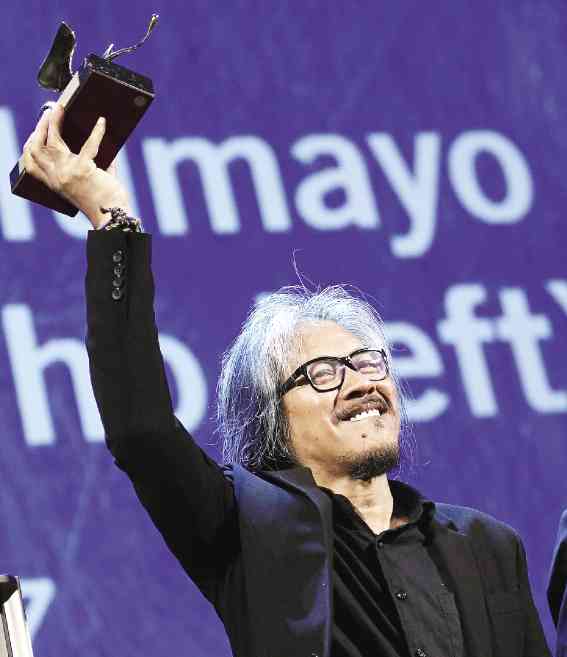After the glamour of the red carpet comes the harsh reality.
It takes a lot to rile up the usually calm and collected filmmaker Lav Diaz.
But when asked about government incentives for Filipinos who have won in international film festivals, Diaz, who had just bagged the Golden Lion in Venice for “Ang Babaeng Humayo,” couldn’t help being passionately candid.
First things first, the government should study closely the role of art in Philippine culture, Diaz told the Inquirer in an e-mail interview.
“Art plays a big role,” he said in Filipino. “From the start, art has always been pushed aside. We just have to look at the government’s budget for culture and the arts.”
When it was announced in July that “Humayo” would be competing in the main section of the 73rd Venice International Film Festival in Italy, Briccio Santos, former chair of the Film Development Council of the Philippines (FDCP), reached out to Diaz with dispatch.
“Briccio immediately texted and promised support,” Diaz recalled.
After all, “Humayo” was the lone Asian film competing for awards at Venice, one of the world’s top three A-list festivals, along with Cannes and Berlin.
(“Humayo” eventually won the Golden Lion, the top prize in the world’s oldest film festival.)
As luck would have it, there was a change in leadership in the FDCP last month, Diaz recounted. “Ted Granados (FDCP executive director under Santos) wrote to say that the agency could only give half of the promised grant, and it would have to follow the reimbursement process.”
That means the filmmaker would have to use his own money first and later surrender all the receipts for liquidation.
“We begged for support from the Senate and the Quezon City local government, but until now, wala (there’s no positive response yet),” he said.
Fortunately, Diaz found a travel agency that allowed members of the entourage to fly on credit.
To scrimp, “we rented a cheap apartment in Venice,” he pointed out. Diaz also cooked the team’s meals during their seven-day stay.
He related that he didn’t get to meet a single representative of the Philippine embassy while there.
“We were in the Main Competition of Venice,” he explained. “It was like the Olympics of cinema. In sports, medalists receive millions worth of incentives. They’re even given a house and lot. But why do filmmakers have to beg for support? Pag-beauty contest, nababaliw ang Palasyo at Kongreso! (When it comes to beauty contests, the Palace and Congress go crazy!)”
Diaz was quick to clarify, however: “I am not complaining. I’m just saying…”
Again, he reiterated the message of his acceptance speech: “We wholeheartedly dedicate the Golden Lion to our country.”
He volunteered that he is likewise sharing the honor with the rest of the team, “the people who sacrificed a lot during the making of the film and also my family, for always understanding.”
Winning is “cool,” he asserted, because “it’s good for Philippine cinema.”
“It proves that we can make decent films. Not to be arrogant, but this year’s lineup includes filmmakers who are considered giants in Hollywood and Europe,” he noted. Also on the roster are Tom Ford, Wim Wenders, Francois Ozon, Emir Kusturica and Terrence Malick.
Personally, the recognition “affirms my faith in cinema and reminds me that I can contribute in my own small way,” he quipped.
Liza Diño, the new chair of the FDCP, told the Inquirer that the agency is “currently requesting for an incentive” for Diaz.
“We are just waiting for approval from the council,” she said. “I just sent a letter to the Presidential Management Staff to organize a grand welcome for Direk Lav and the entire Venice contingent to have a courtesy call with the President.”
Diaz, however, is currently in Boston, for the Radcliffe Fellowship of Harvard University. “Harvard noticed my work. This institution values the role of art in society, so I was invited to be a fellow there. I will stay in Boston for eight months, from September 2016 to May 2017,” he said.
Every year, the program “selects 50 leading artists and scholars who have both exceptional promise and demonstrated accomplishment.”
According to the program’s website, Diaz “will pursue greater discourse on film, write a screenplay and start a book on cinema,” while at Radcliffe.


